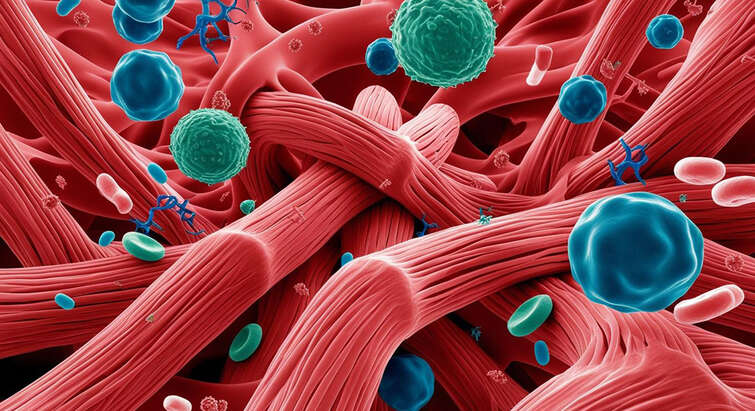
Functional Proteomics in Metabolism in the Deshmukh Group
Our goal is to investigate how diet and exercise alters intra- and intercellular communication and hence the metabolism. We employ Mass-Spectrometry-based proteomics to study cellular communication and uncover new insights into metabolic diseases, and strategies for their prevention and treatment.

Metabolic diseases such as obesity and type 2 diabetes arise from complex, systemic dysfunctions, many of which are driven by altered cellular communication through proteins.
At the Deshmukh Group, we apply cutting-edge proteomics technology to investigate how diet and exercise reshape intra- and intercellular communication, and how these changes influence metabolic regulation and cardiometabolic health. Our research bridges in vivo and in vitro models to uncover protein-driven molecular mechanisms, with a particular focus on:
- Intracellular signaling through post-translational modifications (PTMs)
- Inter-organ communication via secreted proteins
- Single-cell and fiber-type-specific proteomics to explore functional heterogeneity
- Spatial proteomics to resolve tissue- and region-specific responses
By mapping these protein-level changes with high-resolution mass spectrometry, we aim to discover new biomarkers, understand mechanisms of disease progression, and identify therapeutic targets for precision intervention.
“By integrating proteomics into metabolic research, we’re uncovering mechanisms that were previously invisible—offering new paths to understand, prevent, and treat metabolic diseases.”
— Associate Professor Atul Deshmukh
Personalized molecular signatures of insulin resistance and type 2 diabetes
Published in Cell (2025), this study used advanced proteomics to map the skeletal muscle proteome and phosphoproteome in over 120 individuals with varying insulin sensitivity. Fasting-state protein signatures predicted insulin sensitivity, while insulin stimulation revealed both preserved and dysregulated signaling. The dataset also offers insights into sex-specific differences in muscle metabolism.
Human skeletal muscle fiber heterogeneity beyond myosin heavy chains
Published in Nature Communications (2025), the study demonstrates that human skeletal muscle fiber heterogeneity is multi-dimensional and extends beyond traditional classification by myosin heavy chain isoforms both the RNA and protein level. Importantly, the study shows that type 2X fibers were not phenotypically distinct from other fast fibers.
Temporal dynamics of the interstitial fluid proteome in human skeletal muscle following exhaustive exercise
Published in Science Advances (2025), this study showed that exercise alters the skeletal muscle interstitial fluid proteome, triggering a time-dependent release of immune-derived proteins. Among this, the peptide LL-37 promoted muscle cell growth and differentiation, suggesting a potential role in muscle repair after exercise.
Group Leader
Atul S. Deshmukh
PhD, Associate Professor
Phone: +45 3532 5313
atul.deshmukh@sund.ku.dk
LinkedIn Profile

Staff list
| Name | Title | Phone | |
|---|---|---|---|
| Barrès, Romain | Professor | +4535337025 | |
| Deshmukh, Atul Shahaji | Associate Professor | +4535325313 | |
| Ernafasova, Dilfuza | PhD Fellow | +4535331365 | |
| Kurgan, Nigel Kilty | Postdoc | +4535329826 | |
| Moreno Justicia, Roger | Postdoc | +4535334182 | |
| Northcote, Jeppe Kjærgaard | International Researcher | ||
| Prats Quesada, Júlia | PhD Fellow | ||
| Schlabs, Farina Leonie | PhD Fellow | ||
| Stocks, Ben Nicholas | Assistant Professor | +4535332944 |




